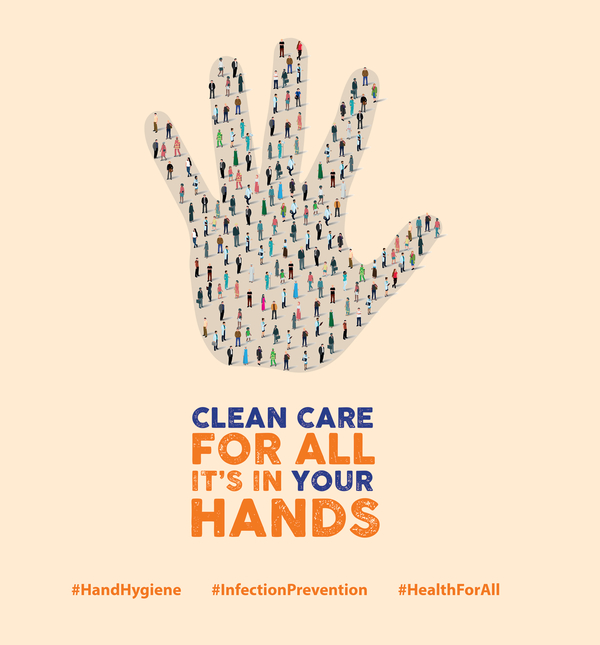Quality healthcare should be available to everyone. The World Health Organization’s (WHO’s) concept of universal health coverage (UHC) 1 embodies the urgent need for access to healthcare for all people around the world. In addition to access, the concept of UHC incorporates the critical element of the necessary quality of delivered healthcare services. Infection prevention and control (IPC), with hand hygiene as the most effective measure, is a practical and evidence-based approach with a demonstrable impact on quality of care and patient safety across all levels of the health system.
Each year, the WHO “SAVE LIVES: Clean Your Hands” campaign aims to bring people together in support of hand hygiene improvement globally on or around May 5th. 2 This year’s theme for global annual hand hygiene day reflects a strong focus on providing clean care, equally protecting all patients and healthcare workers from infection and antimicrobial resistance transmission, across all countries, including in low-resource settings.
The WHO urges ministries of health, healthcare facility leaders, IPC leaders, healthcare workers, and patient advocacy groups to contribute to effective IPC action including hand hygiene as a cornerstone of quality in healthcare (Table 1). The WHO invites all healthcare facilities to join the 2019 WHO Global Survey on IPC and Hand Hygiene using 2 validated assessment tools: one for evaluating the core components of IPC program and the other for a deep dive into hand hygiene activities (https://www.who.int/infection-prevention/campaigns/ipc-global-survey-2019/en/).
Table 1. The May 5, 2019, World Health Organization “SAVE LIVES: Clean Your Hands” Campaign Calls to Action

Note. IPC, infection prevention and control; WHO, World Health Organization.
On a facility level, the use of these tools gives institutions a clear understanding of the strengths and weaknesses of their IPC and hand hygiene program and recommends concrete actions to address existing gaps. These tools allow institutions to improve their IPC practices and policies in concrete and measurable ways, at their own speed and in their own context. The surveys are anonymous, and global results will be made available using only aggregated data. Thus, facilities and ministries of health can commit fully to working on improving IPC and patient safety without fear of scrutiny or possible negative repercussions.
Globally, this survey will allow the WHO to provide a situational analysis of progress of current IPC and hand hygiene activities around the world and inform future efforts and resource use for IPC capacity building and improvement. Global surveys using the hand hygiene self-assessment framework were also conducted in 2011 and 2015, 3 – Reference Kilpatrick, Tartari and Gayet-Ageron 5 making this year’s survey even more crucial for tracking the implementation of hand hygiene and IPC on a global scale (Fig. 1).
Each improvement in IPC contributes toward quality UHC. “Clean care for all—it’s in your hands!”

Fig. 1. May 5, 2019: “Clean care for all—It’s in your hands!” The May 5, 2019, World Health Organization “SAVE LIVES: Clean Your Hands” campaign slogan and main promotional image (2019 hashtags: #HandHygiene #InfectionPrevention #HealthForAll). Campaign participants are invited to submit photos or selfies of them holding a board with the slogan and hashtags at www.CleanHandsSaveLives.org.
Acknowledgments
The authors alone are responsible for the views expressed in this article and they do not necessarily represent the views, decisions, or policies of the institutions with which they are affiliated. WHO takes no responsibility for the information provided or the views expressed in this paper.
Financial support
This work is supported by the World Health Organization (WHO), Geneva, Switzerland, and the Infection Control Program and WHO Collaborating Center on Patient Safety (SPCI/WCC), University of Geneva Hospitals and Faculty of Medicine, Geneva, Switzerland; hand hygiene research activities at the SPCI/WCC are also supported by the Swiss National Science Foundation (grant no. 32003B_163262).
Conflicts of interest
Didier Pittet works with WHO in the context of the WHO initiative “Private Organizations for Patient Safety—Hand Hygiene.” All listed authors declare no financial support, grants, financial interests or consultancy that could lead to conflicts of interest.






